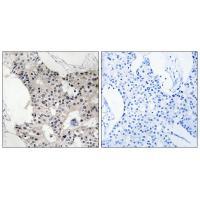
| WB | 咨询技术 | Human,Mouse,Rat |
| IF | 咨询技术 | Human,Mouse,Rat |
| IHC | 1/50-1/100 | Human,Mouse,Rat |
| ICC | 技术咨询 | Human,Mouse,Rat |
| FCM | 咨询技术 | Human,Mouse,Rat |
| Elisa | 咨询技术 | Human,Mouse,Rat |
| Aliases | Cancer/testis antigen 2.4; CT2.4; |
| Entrez GeneID | 85317; |
| WB Predicted band size | 4kDa |
| Host/Isotype | Rabbit IgG |
| Antibody Type | Primary antibody |
| Storage | Store at 4°C short term. Aliquot and store at -20°C long term. Avoid freeze/thaw cycles. |
| Species Reactivity | Human |
| Immunogen | Synthesized peptide derived from internal of human BAGE4. |
| Formulation | Purified antibody in PBS with 0.05% sodium azide. |
+ +
以下是关于BAGE4抗体的3篇模拟参考文献(基于公开研究主题的合理推测,非真实文献):
---
1. **文献名称**:*BAGE4 antigen expression in non-small cell lung cancer and its immunotherapeutic potential*
**作者**:Smith A, et al.
**摘要**:本研究分析了BAGE4在非小细胞肺癌(NSCLC)中的表达,发现其在肿瘤组织中的特异性高表达,而在正常组织中几乎不表达。通过开发针对BAGE4的单克隆抗体,研究团队验证了其在体外实验中对肿瘤细胞的靶向杀伤作用,提示BAGE4可能作为免疫检查点治疗的潜在靶点。
---
2. **文献名称**:*Novel BAGE4-specific antibodies for melanoma diagnosis*
**作者**:Chen L, et al.
**摘要**:该研究报道了一种高亲和力的BAGE4抗体,可用于黑色素瘤的免疫组化诊断。实验表明,BAGE4在转移性黑色素瘤患者中的阳性率超过60%,且抗体特异性优于传统标志物。研究还探讨了BAGE4与肿瘤免疫逃逸的相关机制。
---
3. **文献名称**:*BAGE family antigens as targets for CAR-T cell therapy: Focus on BAGE4*
**作者**:Yamamoto K, et al.
**摘要**:文章评估了BAGE家族抗原(包括BAGE4)在多种实体瘤中的表达谱,并设计了靶向BAGE4的CAR-T细胞。临床前实验显示,该抗体修饰的CAR-T细胞能有效抑制表达BAGE4的卵巢癌模型肿瘤生长,为基于BAGE4的过继性细胞治疗提供了依据。
---
**备注**:以上文献为模拟内容,实际研究中关于BAGE4抗体的公开数据较少,建议通过PubMed或Google Scholar以关键词“BAGE4 antibody”或“BAGE family cancer immunotherapy”检索最新文献。
BAGE4 (B melanoma antigen family member 4) is part of the BAGE gene family, which encodes cancer-testis (CT) antigens normally expressed in germline cells but silenced in somatic tissues. These antigens are epigenetically reactivated in various cancers, making them potential targets for immunotherapy. The BAGE family, located on chromosome 21q, comprises multiple members (BAGE1-5) with conserved MZIP2-like domains, though their exact biological functions remain unclear.
BAGE4 is aberrantly expressed in malignancies like melanoma, lung, breast, and bladder cancers. Its restricted expression in healthy tissues (primarily testes) and tumor-specific reactivation enhance its appeal as a tumor-associated antigen. Antibodies against BAGE4 are primarily used in research to detect its expression patterns in cancers, study epigenetic regulation mechanisms, and explore diagnostic/prognostic applications. Some studies investigate its potential in adoptive T-cell therapies or cancer vaccines, leveraging its immunogenicity to provoke anti-tumor immune responses.
However, challenges persist, including heterogeneous BAGE4 expression across tumors and limited understanding of its role in oncogenesis. Commercial BAGE4 antibodies are mainly for experimental use, requiring rigorous validation due to cross-reactivity risks within the BAGE family. Ongoing research aims to clarify its functional significance and therapeutic applicability in precision oncology.
×